formerly eScholarship Editions


|
|
|
|
Your search for
'Philosophy' in subject
found 102 book(s). | Modify Search | Displaying 41 - 60 of 102 book(s) | |
| 41. | 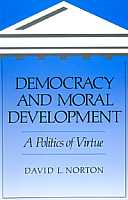 | Title: Democracy and moral development Author: Norton, David L Published: University of California Press, 1990 Subjects: Philosophy | Political Theory | Ethics Publisher's Description: At a time when politics and virtue seem less compatible than oil and water, Democracy and Moral Development shows how to bring the two together. Philosopher David Norton applies classical concepts of virtue to the premises of modern democracy. The centerpiece of the book is a model of organizational . . . [more] Similar Items |
| 42. | 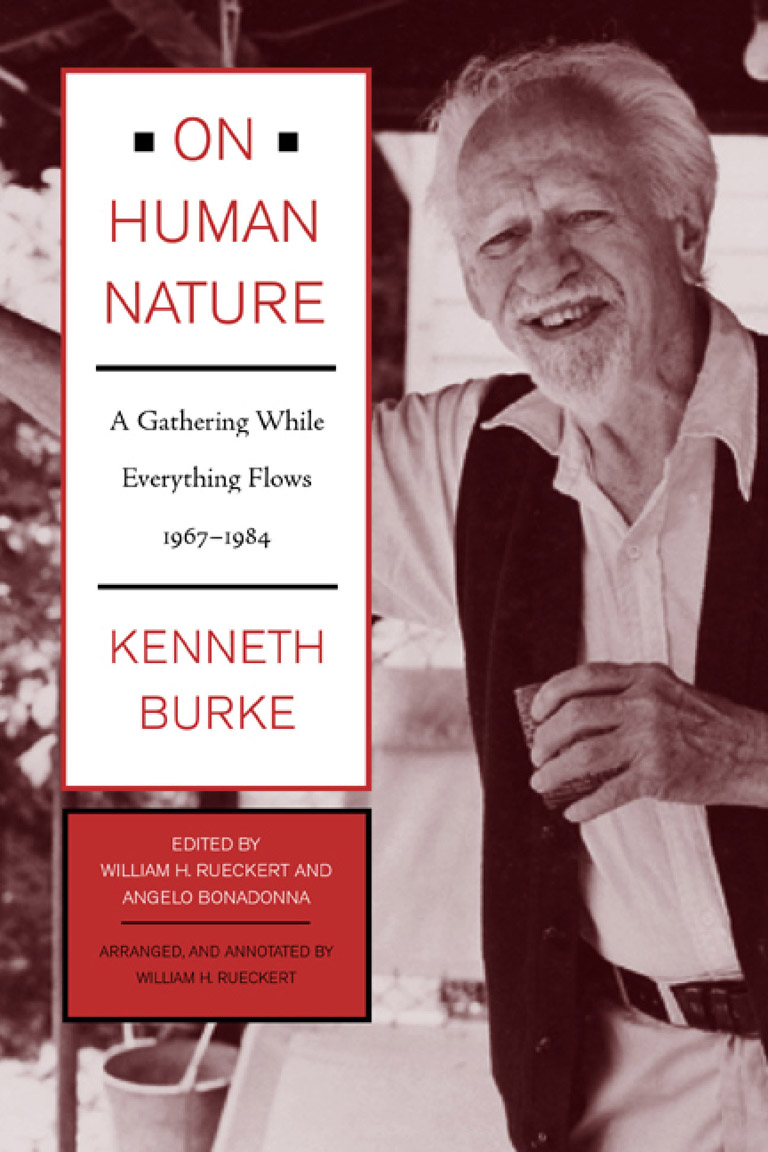 | Title: On human nature: a gathering while everything flows, 1967-1984 Author: Burke, Kenneth 1897- Published: University of California Press, 2003 Subjects: Literature | Literary Theory and Criticism | Intellectual History | Rhetoric | Comparative Literature Publisher's Description: On Human Nature: A Gathering While Everything Flows brings together the late essays, autobiographical reflections, an interview, and a poem by the eminent literary theorist and cultural critic Kenneth Burke (1897-1993). Burke, author of Language as Symbolic Action, A Grammar of Motives, and Rhetoric of Motives, among other works, was an innovative and original thinker who worked at the intersection of sociology, psychology, literary theory, and semiotics. This book, a selection of fourteen representative pieces of his productive later years, addresses many important themes Burke tackled throughout his career such as logology (his attempt to find a universal language theory and methodology), technology, and ecology. The essays also elaborate Burke's notions about creativity and its relation to stress, language and its literary uses, the relation of mind and body, and more. Provocative, idiosyncratic, and erudite, On Human Nature makes a significant statement about cultural linguistics and is an important rounding-out of the Burkean corpus. [brief] Similar Items |
| 43. | 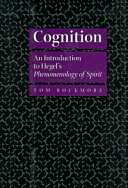 | Title: Cognition: an introduction to Hegel's Phenomenology of spirit Author: Rockmore, Tom 1942- Published: University of California Press, 1997 Subjects: Philosophy | Intellectual History Publisher's Description: Hegel's Phenomenology of Spirit , the philosopher's first and perhaps greatest work, is the most important philosophical treatise of the nineteenth century. In this companion volume to his general introduction to Hegel, Tom Rockmore offers a passage-by-passage guide to the Phenomenology for first-time readers of the book and others who are not Hegel specialists.Rockmore demonstrates that Hegel's concepts of spirit, consciousness, and reason can be treated as elements of a single, coherent theory of knowledge, one that remains strikingly relevant for the contemporary discussion. He shows how the various conceptions of cognition developed in the text culminate in absolute knowing, which Rockmore reads, in opposition to the frequent religious readings of Hegel, in a wholly secular manner. Unlike commentators who isolate Hegel's text from its philosophical origins, Rockmore analyzes the book in the philosophical context from which it emerged, lucidly discussing notoriously difficult passages in relation to the ideas of Aristotle and Descartes, and above all to those of Kant and other German idealists. [brief] Similar Items |
| 44. | 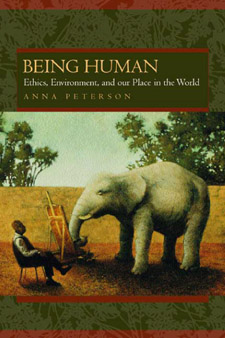 | Title: Being human: ethics, environment, and our place in the world Author: Peterson, Anna Lisa 1963- Published: University of California Press, 2001 Subjects: Religion | Folklore and Mythology | Environmental Studies | Philosophy Publisher's Description: Being Human examines the complex connections among conceptions of human nature, attitudes toward non-human nature, and ethics. Anna Peterson proposes an "ethical anthropology" that examines how ideas of nature and humanity are bound together in ways that shape the very foundations of cultures. Peterson discusses mainstream Western understandings of what it means to be human, as well as alternatives to these perspectives, and suggests that the construction of a compelling, coherent environmental ethics will revise our ideas not only about nature but also about what it means to be human. [brief] Similar Items |
| 45. | 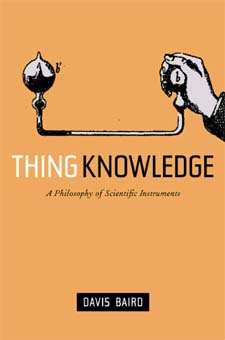 | Title: Thing knowledge: a philosophy of scientific instruments Author: Baird, Davis Published: University of California Press, 2004 Subjects: Philosophy | Technology and Society Publisher's Description: Western philosophers have traditionally concentrated on theory as the means for expressing knowledge about a variety of phenomena. This absorbing book challenges this fundamental notion by showing how objects themselves, specifically scientific instruments, can express knowledge. As he considers numerous intriguing examples, Davis Baird gives us the tools to "read" the material products of science and technology and to understand their place in culture. Making a provocative and original challenge to our conception of knowledge itself, Thing Knowledge demands that we take a new look at theories of science and technology, knowledge, progress, and change. Baird considers a wide range of instruments, including Faraday's first electric motor, eighteenth-century mechanical models of the solar system, the cyclotron, various instruments developed by analytical chemists between 1930 and 1960, spectrometers, and more. [brief] Similar Items |
| 46. | 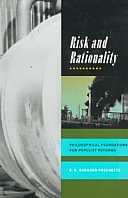 | Title: Risk and rationality: philosophical foundations for populist reforms Author: Shrader-Frechette, K. S 1944- Published: University of California Press, 1991 Subjects: Philosophy | Ethics | Social Problems | Political Theory Publisher's Description: Only ten to twelve percent of Americans would voluntarily live within a mile of a nuclear plant or hazardous waste facility. But industry spokespersons claim that such risk aversion represents ignorance and paranoia, and they lament that citizen protests have delayed valuable projects and increased their costs.Who is right? In Risk and Rationality , Kristin Shrader-Frechette argues that neither charges of irresponsible endangerment nor countercharges of scientific illiteracy frame the issues properly. She examines the debate over methodological norms for risk evaluation and finds analysts arrayed in a spectrum. Points of view extend from cultural relativists who believe that any risk can be justified (since no rational standards are ultimately possible) to naive positivists who believe that risk evaluation can be objective, neutral, and value free. Both camps, she argues, are wrong, because risk evaluation as a social process is rational and objective, even though all risk-evaluation rules are value-laden.Shrader-Frechette defends a middle position called "scientific proceduralism." She shows why extremist views are unreliable, reveals misconceptions underlying current risk-evaluation methods and strategies, and sketches the reforms needed to set hazard assessment and risk evaluation on a publicly defensible foundation.These reforms involve mathematical, economic, ethical, and legal procedures. They constitute a new paradigm for assessment when acceptance of public hazards is rational, recognizing that laypersons are often more rational in their evaluation of societal risks than either experts or governments have acknowledged. Such reforms would provide citizens with more influence in risk decisions and focus on mediating ethical conflicts, rather than seeking to impose the will of experts. Science, she argues, need not preclude democracy. [brief] Similar Items |
| 47. | 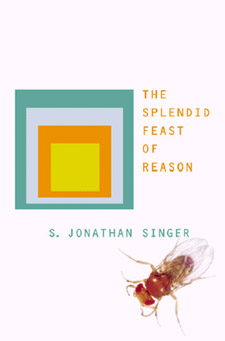 | Title: The splendid feast of reason Author: Singer, Seymour Jonathan 1924- Published: University of California Press, 2001 Subjects: Science | History of Science | Philosophy Publisher's Description: Jonathan Singer's witty, erudite book is a celebration of rationality and an urgent call to make use of intelligence and reason to better cope with human problems. Emphasizing the importance of rationality's greatest achievement, modern science, Singer - one of the foremost biologists of our era - argues that for the first time in several million years humanity has at its disposal the tools for an objective understanding of the external world. Singer demonstrates that, today more than ever, the fullest exercise of rationality is essential if humanity is to rein in a runaway technology and control an explosion of the human population that together threaten to devastate life on this planet within only a few more generations. The intrusion of reason and rationality into our largely irrational world has been painfully slow, uneven, and often unwelcome. Singer explains that for rationalists the founding of modern science - which took place only a few hundred years ago - has overthrown many of the myths of conventional wisdom and dogmas of traditional religions. Yet these beliefs still hold sway over the irrational world, obstructing efforts to deal sensibly with the problematic future of mankind. The core of The Splendid Feast of Reason is an engaging and accessible account of the knowledge that modern science provides. Singer offers an absorbing discussion of how life works, of the nature of reproduction, aging, and death, and of the necessary fragility of the individual life compared to the resilience of life itself. He emphasizes the primary role of the genes in determining the structural organization and the behaviors of living things, including humans. He also stresses the nature and mechanisms of biological evolution, mechanisms that have now been placed in jeopardy because of human ignorance and irrational appetites. Finally, Singer delves into the enigma of the real world with its irrational and chaotic operations and offers suggestions of how a rationalist can not only survive, but thrive in it. [brief] Similar Items |
| 48. | 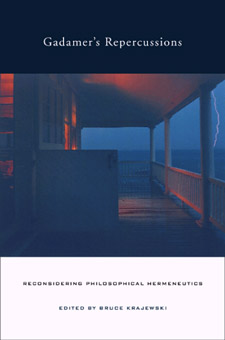 | Title: Gadamer's repercussions: reconsidering philosophical hermeneutics Author: Krajewski, Bruce 1959- Published: University of California Press, 2003 Subjects: Philosophy | Social and Political Thought | European Studies Publisher's Description: Certainly one of the key German philosophers of the twentieth century, Hans-Georg Gadamer also influenced the study of literature, art, music, sacred and legal texts, and medicine. Indeed, while much attention has been focused on Gadamer's writings about ancient Greek and modern German philosophy, the relevance of his work for other disciplines is only now beginning to be properly considered and understood. In an effort to address this slant, this volume brings together many prominent scholars to assess, re-evaluate, and question Hans-Georg Gadamer's works, as well as his place in intellectual history. The book includes a recent essay by Gadamer on "the task of hermeneutics," as well as essays by distinguished contributors including Jürgen Habermas, Richard Rorty, Gerald Bruns, Georgia Warnke, and many others. The contributors situate Gadamer's views in surprising ways and show that his writings speak to a range of contemporary debates - from constitutional questions to issues of modern art. A controversial final section attempts to uncover and clarify Gadamer's history in relation to National Socialism. More an investigation and questioning than a celebration of this venerable and profoundly influential philosopher, this collection will become a catalyst for any future rethinking of philosophical hermeneutics, as well as a significant starting place for rereading and reviewing Hans-Georg Gadamer. [brief] Similar Items |
| 49. | 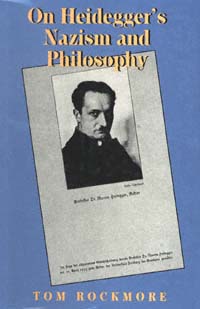 | Title: On Heidegger's Nazism and philosophy Author: Rockmore, Tom 1942- Published: University of California Press, 1991 Subjects: Philosophy | Social and Political Thought | German Studies | Intellectual History Publisher's Description: That Martin Heidegger supported National Socialism has long been common knowledge. Yet the relation between his philosophy and political commitments remains highly contentious and recently has erupted into a vociferous debate. Boldly refuting arguments that the philosopher's political stance was accidental or adopted under coercion, Rockmore argues that Heidegger's philosophical thought and his Nazism are inseparably intertwined, that he turned to National Socialism on the basis of his philosophy, and that his later evolution is largely determined by his continuing concern with Nazism.After developing a framework that clearly outlines the interrelation of Nazism and Heidegger's philosophy, Rockmore analyzes the famous rectoral address the philosopher delivered in 1933 upon becoming rector of the University of Freiburg. In that speech Heidegger sought to ground politics in philosophy. Rockmore examines the inseparable relation of politics and philosophy in Heidegger's Being and Time , the recently published Contributions to Philosophy (written from 1936 to 1938), and the interpretations of Hölderlin, Nietzsche, and technology.In his conclusion Rockmore considers the ongoing discussion of Heidegger's thought and Nazism in France. Combining extensive documentation of the Heidegger controversy with philosophical and historical analysis, this book raises profound questions about the social and political responsibility of philosophy. [brief] Similar Items |
| 50. | 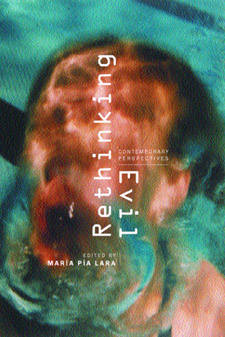 | Title: Rethinking evil: contemporary perspectives Author: Lara, María Pía Published: University of California Press, 2001 Subjects: Philosophy | Ethics | Social and Political Thought | Intellectual History | Social Theory | Social Problems Publisher's Description: This innovative volume will be welcomed by moral and political philosophers, social scientists, and anyone who reflects seriously on the twentieth century's heavy burden of war, genocide, ethnic cleansing, and other evidence of people's desire to harm one another. María Pía Lara brings together a provocative set of essays that reexamine evil in the context of a "postmetaphysical" world, a world that no longer equates natural and human evil and no longer believes in an omnipotent God. The question of how and why God permits evil events to occur is replaced by the question of how and why humans perform radically evil acts. [brief] Similar Items |
| 51. | 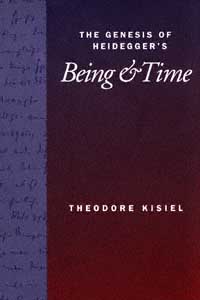 | Title: The genesis of Heidegger's Being and time Author: Kisiel, Theodore J Published: University of California Press, 1995 Subjects: Philosophy | Social and Political Thought | German Studies Publisher's Description: This book, ten years in the making, is the first factual and conceptual history of Martin Heidegger's Being and Time (1927), a key twentieth-century text whose background until now has been conspicuously absent. Through painstaking investigation of European archives and private correspondence, Theodore Kisiel provides an unbroken account of the philosopher's early development and progress toward his masterwork.Beginning with Heidegger's 1915 dissertation, Kisiel explores the philosopher's religious conversion during the bleak war years, the hermeneutic breakthrough in the war-emergency semester of 1919, the evolution of attitudes toward his phenomenological mentor, Edmund Husserl, and the shifting orientations of the three drafts of Being and Time . Discussing Heidegger's little-known reading of Aristotle, as well as his last-minute turn to Kant and to existentialist terminology, Kisiel offers a wealth of narrative detail and documentary evidence that will be an invaluable factual resource for years to come.A major event for philosophers and Heidegger specialists, the publication of Kisiel's book allows us to jettison the stale view of Being and Time as a great book "frozen in time" and instead to appreciate the erratic starts, finite high points, and tentative conclusions of what remains a challenging philosophical "path."This is the first factual and conceptual history of Martin Heidegger's Being and Time (1927), a key twentieth-century text whose background until now has been conspicuously absent. Through painstaking investigation of European archives and private correspondence, Kisiel provides an unbroken account of the philosopher's early development and progress toward his masterwork. [brief] Similar Items |
| 52. | 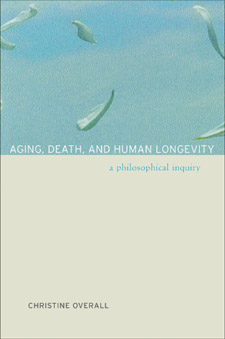 | Title: Aging, death, and human longevity: a philosophical inquiry Author: Overall, Christine 1949- Published: University of California Press, 2003 Subjects: Philosophy | Ethics | Public Policy Publisher's Description: With the help of medicine and technology we are living longer than ever before. As human life spans have increased, the moral and political issues surrounding longevity have become more complex. Should we desire to live as long as possible? What are the social ramifications of longer lives? How does a longer life span change the way we think about the value of our lives and about death and dying? Christine Overall offers a clear and intelligent discussion of the philosophical and cultural issues surrounding this difficult and often emotionally charged issue. Her book is unique in its comprehensive presentation and evaluation of the arguments - both ancient and contemporary - for and against prolonging life. It also proposes a progressive social policy for responding to dramatic increases in life expectancy. Writing from a feminist perspective, Overall highlights the ways that our biases about race, class, and gender have affected our views of elderly people and longevity, and her policy recommendations represent an effort to overcome these biases. She also covers the arguments surrounding the question of the "duty to die" and includes a provocative discussion of immortality. After judiciously weighing the benefits and the risks of prolonging human life, Overall persuasively concludes that the length of life does matter and that its duration can make a difference to the quality and value of our lives. Her book will be an essential guide as we consider our social responsibilities, the meaning of human life, and the prospects of living longer. [brief] Similar Items |
| 53. | 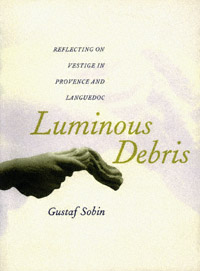 | Title: Luminous debris: reflecting on vestige in Provence and Languedoc Author: Sobin, Gustaf Published: University of California Press, 2000 Subjects: Literature | Cultural Anthropology | European Studies | Ancient History | Philosophy | French Studies Publisher's Description: Interpreting vestige with the eloquence of a poet and the knowledge of a field archaeologist, Gustaf Sobin explores his elected terrain: the landscapes of Provence and Languedoc. Drawing on prehistory, protohistory, and Gallo-Roman antiquity, the twenty-six essays in this book focus on a particular place or artifact for the relevance inherent in each. A Bronze Age earring or the rippling wave pattern in Massiolite ceramic are more than archival curiosities for Sobin. Instead they invite inquiry and speculation on existence itself: Artifacts are read as realia, and history as an uninterrupted sequence of object lessons.As much travel writing as meditative discourse, Luminous Debris is enhanced by a prose that tracks, questions, and reflects on the materials invoked. Sobin engages the reader with precise descriptions of those very materials and the messages to be gleaned from their examination, be they existential, ethical, or political.An American expatriate living in Provence for the past thirty-five years, Gustaf Sobin shares his enthusiasm for his adopted landscape and for a vertical interpretation of its strata. In Luminous Debris he creates meaning out of matter and celebrates instances of reality, past and present. [brief] Similar Items |
| 54. | 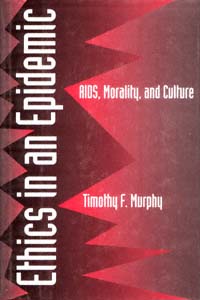 | Title: Ethics in an epidemic: AIDS, morality, and culture Author: Murphy, Timothy F 1955- Published: University of California Press, 1994 Subjects: Philosophy | Sociology | Ethics | Medicine | Social Problems Publisher's Description: AIDS strikes most heavily at those already marginalized by conventional society. With no immediate prospect of vaccination or cure, how can liberty, dignity, and reasoned hope be preserved in the shadow of an epidemic? In this humane and graceful book, philosopher Timothy Murphy offers insight into our attempts - popular and academic, American and non-American, scientific and political - to make moral sense of pain.Murphy addresses the complex moral questions raised by AIDS for health-care workers, politicians, policy makers, and even people with AIDS themselves. He ranges widely, analyzing contrasting visions of the origin and the future of the epidemic, the moral and political functions of obituaries, the uncertain value of celebrity involvement in anti-AIDS education, the functional uses of AIDS in the discourse of presidential campaigns, the exclusionary function of HIV testing for immigrants, the priority given to AIDS on the national health agenda, and the hypnotic publicity given to "innocent" victims.Murphy's discussions of the many social and political confusions about AIDS are unified by his attempt to articulate the moral assumptions framing our interpretations of the epidemic. By understanding those assumptions, we will be in a better position to resist self-serving and invidious moralizing, reckless political response, and social censure of the sick and the dying. [brief] Similar Items |
| 55. | 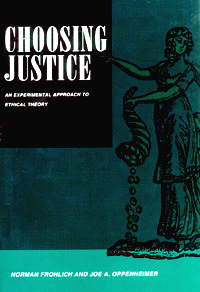 | Title: Choosing justice: an experimental approach to ethical theory Author: Frohlich, Norman Published: University of California Press, 1992 Subjects: Politics | Economics and Business | Philosophy | Political Theory | Social Theory | Ethics Similar Items |
| 56. | 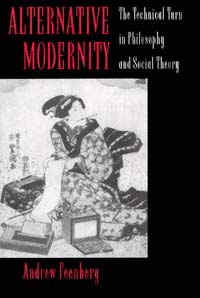 | Title: Alternative modernity: the technical turn in philosophy and social theory Author: Feenberg, Andrew Published: University of California Press, 1995 Subjects: Philosophy | Social and Political Thought | History and Philosophy of Science | Popular Culture Publisher's Description: In this new collection of essays, Andrew Feenberg argues that conflicts over the design and organization of the technical systems that structure our society shape deep choices for the future. A pioneer in the philosophy of technology, Feenberg demonstrates the continuing vitality of the critical theory of the Frankfurt School. He calls into question the anti-technological stance commonly associated with its theoretical legacy and argues that technology contains potentialities that could be developed as the basis for an alternative form of modern society.Feenberg's critical reflections on the ideas of Jürgen Habermas, Herbert Marcuse, Jean-François Lyotard, and Kitaro Nishida shed new light on the philosophical study of technology and modernity. He contests the prevalent conception of technology as an unstoppable force responsive only to its own internal dynamic and politicizes the discussion of its social and cultural construction.This argument is substantiated in a series of compelling and well-grounded case studies. Through his exploration of science fiction and film, AIDS research, the French experience with the "information superhighway," and the Japanese reception of Western values, he demonstrates how technology, when subjected to public pressure and debate, can incorporate ethical and aesthetic values. [brief] Similar Items |
| 57. |  | Title: Profane illumination: Walter Benjamin and the Paris of surrealist revolution Author: Cohen, Margaret Published: University of California Press, 1993 Subjects: German Studies | Philosophy | Literary Theory and Criticism Publisher's Description: Margaret Cohen's encounter with Walter Benjamin, one of the twentieth century's most influential cultural and literary critics, has produced a radically new reading of surrealist thought and practice. Cohen analyzes the links between Breton's surrealist fusion of psychoanalysis and Marxism and Benjamin's post-Enlightenment challenge to Marxist theory. She argues that Breton's surrealist Marxism played a formative role in shaping postwar French intellectual life and is of continued relevance to the contemporary intellectual scene. [brief] Similar Items |
| 58. | 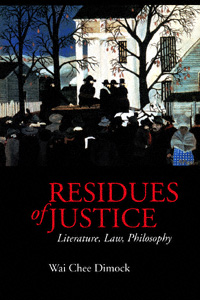 | Title: Residues of justice: literature, law, philosophy Author: Dimock, Wai-chee 1953- Published: University of California Press, 1996 Subjects: Literature | Literary Theory and Criticism | American Studies | Law | Philosophy Publisher's Description: In this arresting book, Wai Chee Dimock takes on the philosophical tradition from Kant to Rawls, challenging its conception of justice as foundational, self-evident, and all-encompassing. The idea of justice is based on the premise that the world can be resolved into commensurate terms: punishment equal to the crime, redress equal to the injury, benefit equal to the desert. Dimock focuses, however, on what remains unexhausted, unrecovered, and noncorresponding in the exercise of justice. To honor these "residues," she turns to literature, which, in its linguistic density, transposes the clean abstractions of law and philosophy into persistent shadows, the abiding presence of the incommensurate. Justice can only be a partial answer to the phenomenon of human conflict.In arguing for justice as an incomplete virtue, Dimock draws upon legal history, political philosophy, linguistics, theology, and feminist theory; she discusses Aristotle and Augustine, Locke and Luther, Marx and Durkheim, Michael Sandel and Carol Gilligan, Noam Chomsky and Mary Ann Glendon. She also examines an unusual configuration of nineteenth-century American authors, pairing figures such as Herman Melville and Rebecca Harding Davis, Walt Whitman and Susan Warner.The result is a book both passionate and scholarly. It invites us to rethink the meanings of literature, law, and philosophy, and to imagine a language of community more supple and more nuanced than the language of justice. [brief] Similar Items |
| 59. | 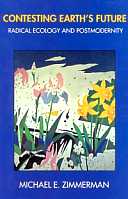 | Title: Contesting Earth's future: radical ecology and postmodernity Author: Zimmerman, Michael E 1946- Published: University of California Press, 1994 Subjects: Philosophy | Social and Political Thought | Natural History | Ecology | Sociology Publisher's Description: Radical ecology typically brings to mind media images of ecological activists standing before loggers' saws, staging anti-nuclear marches, and confronting polluters on the high seas. Yet for more than twenty years, the activities of organizations such as the Greens and Earth First! have been influenced by a diverse, less-publicized group of radical ecological philosophers. It is their work - the philosophical underpinnings of the radical ecological movement - that is the subject of Contesting Earth's Future .The book offers a much-needed, balanced appraisal of radical ecology's principles, goals, and limitations. Michael Zimmerman critically examines the movement's three major branches - deep ecology, social ecology, and ecofeminism. He also situates radical ecology within the complex cultural and political terrain of the late twentieth century, showing its relation to Martin Heidegger's anti-technological thought, 1960s counterculturalism, and contemporary theories of poststructuralism and postmodernity.An early and influential ecological thinker, Zimmerman is uniquely qualified to provide a broad overview of radical environmentalism and delineate its various schools of thought. He clearly describes their defining arguments and internecine disputes, among them the charge that deep ecology is an anti-modern, proto-fascist ideology. Reflecting both the movement's promise and its dangers, this book is essential reading for all those concerned with the worldwide ecological crisis. [brief] Similar Items |
| 60. |  | Title: Descartes's imagination: proportion, images, and the activity of thinking Author: Sepper, Dennis L Published: University of California Press, 1996 Subjects: Philosophy | History and Philosophy of Science Publisher's Description: Renè Descartes is commonly portrayed as a strict rationalist, a philosopher who theorized a radical, unresolvable split between mind and body. In this long-overdue examination of the role of imagination in Descartes's thought, Dennis Sepper reveals a Descartes quite different from the usual dualistic portrayals and offers a critical reconception of the genesis and nature of the philosopher's thought.In a vigorous analysis of the less-known early works, Sepper finds that initially Descartes assigned the imagination a central role in the mind's activity. Although Descartes eventually lost confidence in the philosophy of imagination, an early understanding of its central role in cognition came to shape the most fundamental notions of his mature philosophy. Sepper's radical reassessment of Descartes ultimately raises new questions about the development of modern philosophy. [brief] Similar Items |